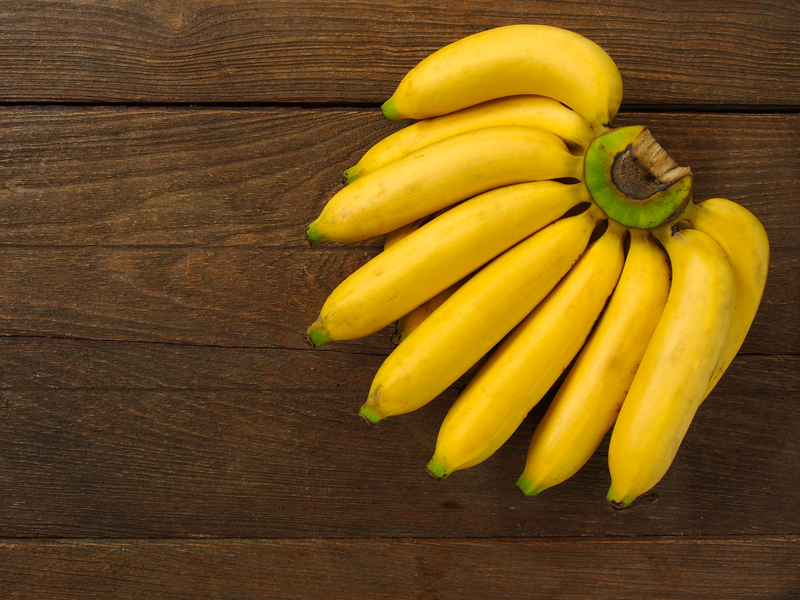The future of the UK’s favourite fruit hangs in the balance, but researchers from Exeter University are tackling the threat to the banana supply chain
Researchers at the University of Exeter have been awarded £1.2 million to investigate the resilience of the UK’s banana supply. Bananas are the most popular fruit in the world by production. More than five billion bananas are purchased in Britain each year, and the UK accounts for around 7% of the global export market. Bananas are so important to the global economy that the EU and USA have fought trade wars over them.
Now, the impacts of climate change, emerging plant diseases, and economic uncertainty threaten the banana supply chain, potentially impacting diet and nutrition in importing nations, as well as the livelihoods of producers in the developing world. The University of Exeter project brings together biologists, ecologists, economists and social scientists with the UN FAO, NGOs and businesses to address the resilience of the banana supply chain from plantation to fruit bowl.
Bananas serve as an example of a major, wholly-imported commodity to the UK. Whatever the long-term result, the immediate impact of the UK’s decision to leave the EU has seen a rapid drop in the value of the pound, leading to concerns over the costs of imports to the British consumer. The Consumer Price Index, stable from 2014 to the beginning of 2016, has risen sharply since the beginning of the year.
Food price rises are of particular concern because of the impact they can have on poorer families. Consumers have benefited from food price deflation since the summer of 2014, but this could well change. Justin King, the former CEO of Sainsbury’s, has suggested that supermarket prices will rise by at least 5% over the next six months, as retailers eventually pass on price rises. As pointed out by Mike Coupe, Sainsbury’s current chief executive, we live in a globalised world from which cheaper alternatives can be sourced. Hence, the shock of our reduced purchasing power could reverberate through our trade networks.
Global Food Security: Bananas on the agenda
Economic resilience refers to the ability of an economy to absorb sudden changes or shocks, and quickly return to normal. The resilience of the food system has been high on the policy agenda since the global financial crisis of 2008, which doubled food prices in the space of a few weeks. Global food prices declined again at the beginning of 2016, but have since increased. The danger of rapid price fluctuations is that planning becomes difficult; either producers are impoverished by unexpectedly low revenues, or consumers are faced with expensive food.
The negative impacts of non-resilient food systems are so severe that the UK government has launched a major research initiative, the Global Food Security programme, to tackle the issue. The programme is funding projects that bring together academics, non-governmental organisations, businesses and policymakers, to provide the knowledge and guidance needed to strengthen food supply chains against future shocks. Recognising the interconnected nature of food supply, the programme will address the resilience of the UK food system in a global context.
My colleagues and I at the University of Exeter are fortunate in leading one of the first projects within the Global Food Security programme. We have decided to look at a food that, while being incredibly popular, bears all the signs of being highly vulnerable to production shocks: the banana.
The UK is highly dependent upon imported fruit and vegetables, which make up 80% of the market. This compares with half of the cereals and one-sixth of meat and dairy produce. Fruit and vegetables are a key component of a healthy diet, yet are often overlooked in studies of global food security, where the focus is on the major grains. Reliance on imported fruit and vegetables makes the UK vulnerable to instabilities in international production and supply, so jeopardising the resilience of the UK food system.
A cheap and healthy snack
This vulnerability is epitomised by the banana, the most popular fruit in the UK by consumption, and the most important fruit in the world by production. Bananas have significant health benefits, particularly in comparison with alternative ‘snack’ foods, such as cereal bars containing refined sugars, salt and fat. Bananas have a low glycaemic index and contain resistant starches rather than the ‘free sugars’ that contribute to diabetes, obesity and tooth decay. Bananas promote a healthy gut flora and consumption is linked to reduced tooth decay in children compared with more acidic fruit like apples and citrus. The banana is a cheap, healthy snack enjoyed by millions of Britons every day.
However, scientists are increasingly concerned about the future of the banana. A recent expansion of the virulent fungal disease Fusarium wilt, also known as Panama Disease, has highlighted the extreme risk facing the global banana trade. Though many varieties are grown around the world for domestic consumption, international trade relies on a single susceptible variety, Cavendish. Fusarium wilt destroyed the previous export variety ‘Gros Michel’ in the 1950s, but now there is no alternative resistant variety waiting in the wings, nor any known control for the disease.
This strain of the disease emerged in Taiwan, covering Southeast Asia in the 1990s and spreading recently to Australia, Mozambique, and the Middle East. If this new strain of wilt reaches Latin America and the Caribbean, from where the EU (and the US) purchase the vast majority of bananas, the most popular fruit in the UK could disappear from supermarkets. Not only would this dramatically alter UK diets, but producers and developing economies would be impacted with potentially far-reaching consequences. Other pests and diseases are also emerging, many of which also lack viable controls.
Banana supply chain particularly vulnerable
The UK retail trade increases vulnerability in the system. The Fairtrade Foundation estimates that the consumer price of bananas has halved over the past decade, while production costs have doubled. Today, the wholesale import price of bananas matches the retail price: the margin is zero. Concern over social and environmental impacts of banana production has led to a significant market for Fairtrade and Organic-certified bananas. However, UK supermarkets have been engaged in a “banana price war”, resulting in prices that are insufficient to adequately support producers, and reduce investment in improved production methods, development of new varieties, and social and environmental sustainability. If bananas are to remain a key component of the UK food system, analysis of these threats and mechanisms to counter them must be developed.
Our team of ecologists, biologists, economists, and social scientists will work closely with the United Nations World Banana Forum, the UK charity Bananalink, and major retailers, to address diverse threats facing bananas. Our aim is to determine how emerging diseases and other factors like changing climate will affect banana production and to test new methods for disease control.
Our research will complement the development of new resistant tradable varieties and fundamental disease biology ongoing around the world. We will analyse how production shocks will affect the UK market, how the UK retail sector and consumers might respond, and how those responses could feedback to producers in the developing world. Through the World Banana Forum, we will work with retailers, producer groups, and other stakeholders to produce strategies to increase the resilience of the banana trade to production shocks, and secure the future of the UK’s favourite fruit.
Senior Lecturer in Microbial Ecology
Department of Biosciences
University of Exeter
Tel: +44 1392 725851
Please note: this is a commercial profile











